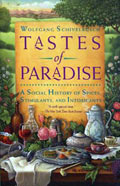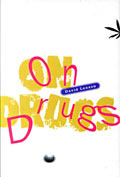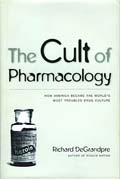The Pleasures of Reading
Book Recommendations for the Drug Geek
Jun 2009
Citation: Thyssen S. "The Pleasures of Reading: Book Recommendations for the Drug Geek". Erowid Extracts. Jun 2009;16:10-11.
As for me, I am an inveterate pharmacophile, but would have to acknowledge that the habituation which most rules my life, is my lifelong addiction to books--reading them, writing them, even handling and smelling them! Some might rebel at this notion of 'book addiction,' but in fact one of the earliest uses of this word in English [in 1675], was "His own proper Industry and Addiction to Books," and a century passed before addiction was used in reference to drugs--to tobacco, at first [vide: Oxford English Dictionary, page 26].
-- Jonathan Ott, Pharmacophilia or the Natural Paradises
-- Jonathan Ott, Pharmacophilia or the Natural Paradises
The proliferation of digital media in the last 15 years can sometimes make us forget that books form the foundation of much of the knowledge about psychoactives that we take for granted. Erowid is interested in learning what top books other drug geeks would recommend, whether as introductory texts, or picks covering a focused topic.
When it came time to highlight my favorite psychoactive-oriented titles, I decided to follow a simple pleasure principle: I chose books that compel me to sit down, ignore the computer and all the distractions that it brings, and immerse myself in the story that an author has assembled. And while I do occasionally get frustrated that I can't pick them up from the shelf and query them with a search term, the slower cognitive pace that books demand provides a much-needed respite from the quicker, Internet-centric information processing that dominates my working hours.
The following three books about psychoactive drugs stand out for the sheer joy of reading they give, as well as their insights into culture, politics, and pharmacology.

|
Tastes of Paradise: A Social History of Spices, Stimulants, and Intoxicants
by Wolfgang Schivelbusch (1993)The historical nugget. Originally published in German in 1980, translated into English in 1992, and then released in a 1993 American edition, Tastes of Paradise presents a great deal of historical detail in an abundantly (black & white) illustrated 239 pages. Even before the first chapter, which begins with salt and pepper, the book's translator reflects on the limits and possibilities of language itself: in the original German, the book's topic is Genussmittel, "a group of substances for human consumption which are eaten, drunk, or inhaled to created pleasures of the senses, as opposed to those foods and beverages consumed as necessities." In Pharmacotheon, Jonathan Ott describes a number of words that we use in English to refer to inebriating substances, and none of them fits quite the same delicious niche as "Genussmittel", a term carrying a sensual connotation that includes consumables one would not consider inebriants. Unfortunately, unlike the extremely well-indexed Pharmacotheon, Tastes of Paradise offends geek sensibilities with its lack of an index (although there is a bibliography, at least).
Schivelbusch places the fruits of colonial conquest in the context of cultural history, delving into topics such as the impact that the introduction of coffee had on Europe. He describes tensions in the seventeenth century when coffee emerged as the ingestible embodiment of the Protestant ethic. At the time, coffee was not universally accepted, and the manipulation of wakefulness that it allowed was regarded with suspicion by many. In eighteenth-century Germany, a prohibition on coffee was temporarily enacted in an attempt to curb the consumption of an imported commodity and to help return domestically produced beer to its hallowed role.
Tastes of Paradise offers refreshingly succinct social analyses of the roles that spices, coffee, tea, chocolate, tobacco, and alcohol have played in Western culture, and complements longer works that cover similar territory, such as Dale Pendell's Pharmako~ trilogy.

|
On Drugs
by David Lenson (1995)Metadisciplinary mind candy. "I have undertaken this project precisely because I am unqualified to do so." In possibly my favorite line in the entire book, Lenson, a professor of comparative literature, describes in the Preface how nothing in his professional background qualifies him to write about drugs. Noting that the war on drugs has codified types of allowable discourse on psychoactives, he applies his literary training to describing roughly seven genres into which writings on drugs fall, and exploring the conventions of each. Then, in a series of essays seeking "that forbidden focus, the user's point of view", he invites the reader to transcend these categories. The essays are potent, well referenced, and annotated. "What is 'Straight' Consciousness?" and "Toward a Diversity of Consciousness" are worth the cost of the book alone.
Among many other topics, Lenson discusses the problems with medicalizing the impulse to seek euphoria, and how the rampant Consumerism (yes, he capitalizes it) that requires that something perpetually be desired paves the way for the "spiritual illness" that engenders addiction, as posited by Alcoholics Anonymous. My second favorite sentence comes from the book's concluding chapter:
The silence wrought by the "Just Say No" campaign must be replaced by words, many, many words. And these words must come not only from police, doctors, sociologists, criminologists, and the usual experts, but from gang members, drugs users, drug dealers, and underground manufacturers.Yeah! Fourteen years after its publication, On Drugs still feels fresh in its call to move beyond divisive posturing and verbal constructions that quell discourse on one of the most significant questions we should be asking: how do drug-taking behaviors reflect and shape personal and societal consciousness? An intellectually invigorating yet down-to-earth pharmacography.

|
The Cult of Pharmacology: How America Became the Word's Most Troubled Drug Culture
by Richard DeGrandpre (2006)An informed journalistic tour. The Cult of Pharmacology is a great companion to Tastes of Paradise and On Drugs, in part because it also brings scientific research to the table, thanks to the author's background in psychopharmacology. The connection between morality and psychoactive substances that appeared during the Protestant Reformation, discussed in Tastes of Paradise, reappears in DeGrandpre's examination of America's legacy of vilifying some substances and deifying others. In an exhaustive series of well-referenced examples, the author updates the concept, discussing recent developments such as congressional hearings on tobacco and the troubling state of the antidepressant industry. He explores how the reputation of a drug, as well as its effects, are often heavily dependent on contextual factors distinct from its pharmacological action. As in On Drugs, DeGrandpre assesses psychoactive substances as verbal constructions, complete with their own mythologies, which he refers to as "placebo texts". He proposes that knowledge or ignorance of the pharmacological action of a drug may even dictate how it is experienced by users and viewed by society. The medicalization of euphoriants is illustrated with historical vignettes, such as the huge revenues generated from whiskey prescriptions written by physicians during alcohol Prohibition. The unpacking of so many fascinating stories about "drugs" in America is enough to recommend The Cult of Pharmacology.
One common thread among all three titles is that they show that there are no simple answers when it comes to psychoactive substances. Knowledge evolves as new data becomes available, and understanding changes as questions and answers become more complex, often restricting the kinds of things we can truly claim to "know".
The range of opinion on psychoactives is staggeringly diverse, and requires critical examination of historical and scientific data. If you're looking for additions to your bookshelf that match the non-ideological, information-dense variety of the Erowid site itself, then I highly recommend Tastes of Paradise, On Drugs, and The Cult of Pharmacology. If I had to compile an "informed drug-geek starter library", they would be early additions to the collection.

